Report on Cultural Intelligence Workshop and Training at Rydeges Hotel
VerifiedAdded on 2023/06/10
|11
|2433
|444
Report
AI Summary
This report details a cultural intelligence (CQ) workshop and training program designed for Rydeges Hotels, focusing on enhancing the workforce's ability to function effectively in a multicultural environment. The report emphasizes the importance of CQ in improving cross-cultural interactions, especially in the hospitality industry where diverse customer bases are common. It outlines the aims and objectives of the workshop, which include ending cultural biases, promoting understanding of cultural differences, and improving employee efficiency. The report also discusses the learning outcomes, which are structured around the four CQ capabilities: strategy, action/behavior, drive/motivation, and knowledge. A sample training schedule is provided, detailing activities, methods, and resources for a one-day workshop. The conclusion highlights the benefits of CQ training in decision-making and effective communication within the workplace, ultimately leading to improved organizational performance and customer satisfaction. The report references several academic sources to support its findings.
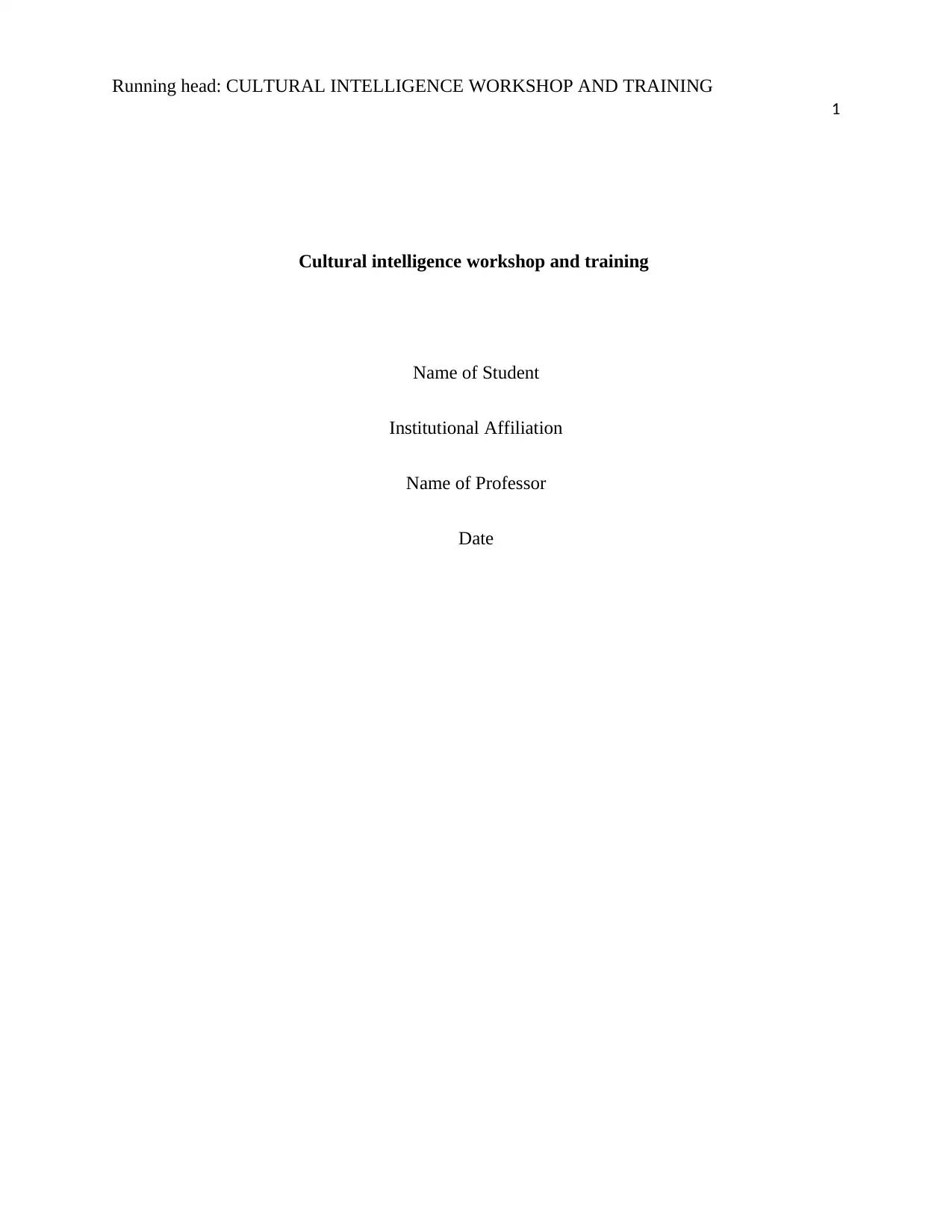
Running head: CULTURAL INTELLIGENCE WORKSHOP AND TRAINING
1
Cultural intelligence workshop and training
Name of Student
Institutional Affiliation
Name of Professor
Date
1
Cultural intelligence workshop and training
Name of Student
Institutional Affiliation
Name of Professor
Date
Paraphrase This Document
Need a fresh take? Get an instant paraphrase of this document with our AI Paraphraser
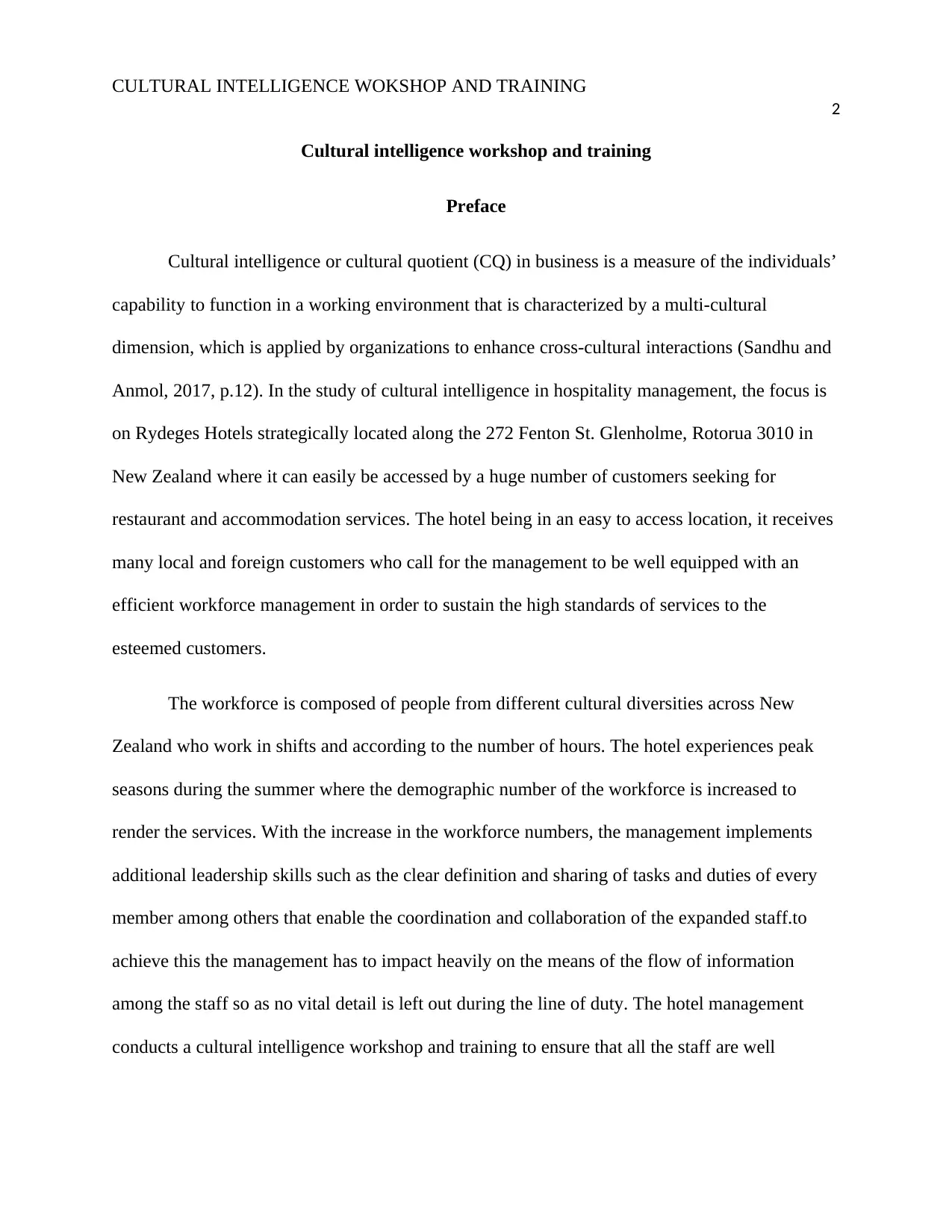
CULTURAL INTELLIGENCE WOKSHOP AND TRAINING
2
Cultural intelligence workshop and training
Preface
Cultural intelligence or cultural quotient (CQ) in business is a measure of the individuals’
capability to function in a working environment that is characterized by a multi-cultural
dimension, which is applied by organizations to enhance cross-cultural interactions (Sandhu and
Anmol, 2017, p.12). In the study of cultural intelligence in hospitality management, the focus is
on Rydeges Hotels strategically located along the 272 Fenton St. Glenholme, Rotorua 3010 in
New Zealand where it can easily be accessed by a huge number of customers seeking for
restaurant and accommodation services. The hotel being in an easy to access location, it receives
many local and foreign customers who call for the management to be well equipped with an
efficient workforce management in order to sustain the high standards of services to the
esteemed customers.
The workforce is composed of people from different cultural diversities across New
Zealand who work in shifts and according to the number of hours. The hotel experiences peak
seasons during the summer where the demographic number of the workforce is increased to
render the services. With the increase in the workforce numbers, the management implements
additional leadership skills such as the clear definition and sharing of tasks and duties of every
member among others that enable the coordination and collaboration of the expanded staff.to
achieve this the management has to impact heavily on the means of the flow of information
among the staff so as no vital detail is left out during the line of duty. The hotel management
conducts a cultural intelligence workshop and training to ensure that all the staff are well
2
Cultural intelligence workshop and training
Preface
Cultural intelligence or cultural quotient (CQ) in business is a measure of the individuals’
capability to function in a working environment that is characterized by a multi-cultural
dimension, which is applied by organizations to enhance cross-cultural interactions (Sandhu and
Anmol, 2017, p.12). In the study of cultural intelligence in hospitality management, the focus is
on Rydeges Hotels strategically located along the 272 Fenton St. Glenholme, Rotorua 3010 in
New Zealand where it can easily be accessed by a huge number of customers seeking for
restaurant and accommodation services. The hotel being in an easy to access location, it receives
many local and foreign customers who call for the management to be well equipped with an
efficient workforce management in order to sustain the high standards of services to the
esteemed customers.
The workforce is composed of people from different cultural diversities across New
Zealand who work in shifts and according to the number of hours. The hotel experiences peak
seasons during the summer where the demographic number of the workforce is increased to
render the services. With the increase in the workforce numbers, the management implements
additional leadership skills such as the clear definition and sharing of tasks and duties of every
member among others that enable the coordination and collaboration of the expanded staff.to
achieve this the management has to impact heavily on the means of the flow of information
among the staff so as no vital detail is left out during the line of duty. The hotel management
conducts a cultural intelligence workshop and training to ensure that all the staff are well
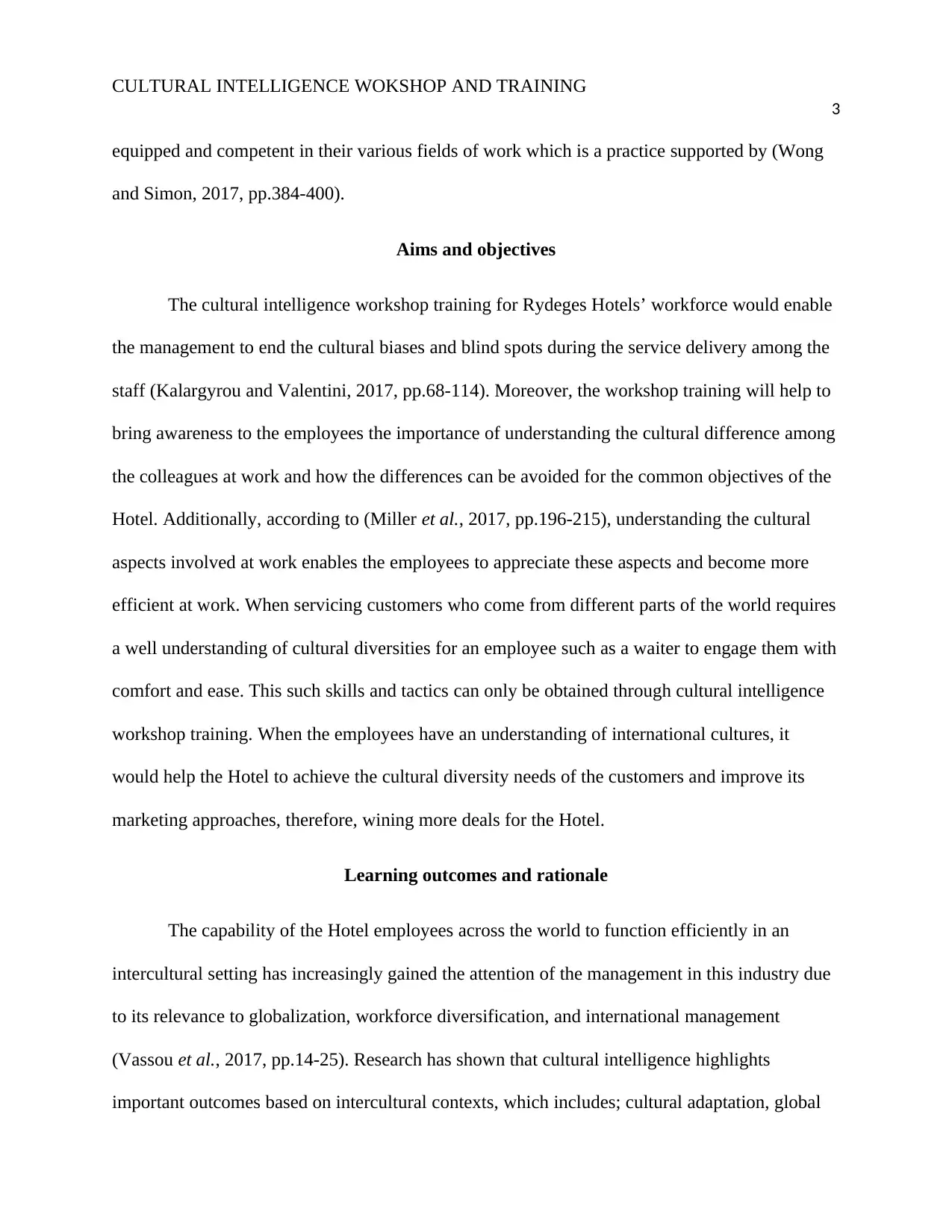
CULTURAL INTELLIGENCE WOKSHOP AND TRAINING
3
equipped and competent in their various fields of work which is a practice supported by (Wong
and Simon, 2017, pp.384-400).
Aims and objectives
The cultural intelligence workshop training for Rydeges Hotels’ workforce would enable
the management to end the cultural biases and blind spots during the service delivery among the
staff (Kalargyrou and Valentini, 2017, pp.68-114). Moreover, the workshop training will help to
bring awareness to the employees the importance of understanding the cultural difference among
the colleagues at work and how the differences can be avoided for the common objectives of the
Hotel. Additionally, according to (Miller et al., 2017, pp.196-215), understanding the cultural
aspects involved at work enables the employees to appreciate these aspects and become more
efficient at work. When servicing customers who come from different parts of the world requires
a well understanding of cultural diversities for an employee such as a waiter to engage them with
comfort and ease. This such skills and tactics can only be obtained through cultural intelligence
workshop training. When the employees have an understanding of international cultures, it
would help the Hotel to achieve the cultural diversity needs of the customers and improve its
marketing approaches, therefore, wining more deals for the Hotel.
Learning outcomes and rationale
The capability of the Hotel employees across the world to function efficiently in an
intercultural setting has increasingly gained the attention of the management in this industry due
to its relevance to globalization, workforce diversification, and international management
(Vassou et al., 2017, pp.14-25). Research has shown that cultural intelligence highlights
important outcomes based on intercultural contexts, which includes; cultural adaptation, global
3
equipped and competent in their various fields of work which is a practice supported by (Wong
and Simon, 2017, pp.384-400).
Aims and objectives
The cultural intelligence workshop training for Rydeges Hotels’ workforce would enable
the management to end the cultural biases and blind spots during the service delivery among the
staff (Kalargyrou and Valentini, 2017, pp.68-114). Moreover, the workshop training will help to
bring awareness to the employees the importance of understanding the cultural difference among
the colleagues at work and how the differences can be avoided for the common objectives of the
Hotel. Additionally, according to (Miller et al., 2017, pp.196-215), understanding the cultural
aspects involved at work enables the employees to appreciate these aspects and become more
efficient at work. When servicing customers who come from different parts of the world requires
a well understanding of cultural diversities for an employee such as a waiter to engage them with
comfort and ease. This such skills and tactics can only be obtained through cultural intelligence
workshop training. When the employees have an understanding of international cultures, it
would help the Hotel to achieve the cultural diversity needs of the customers and improve its
marketing approaches, therefore, wining more deals for the Hotel.
Learning outcomes and rationale
The capability of the Hotel employees across the world to function efficiently in an
intercultural setting has increasingly gained the attention of the management in this industry due
to its relevance to globalization, workforce diversification, and international management
(Vassou et al., 2017, pp.14-25). Research has shown that cultural intelligence highlights
important outcomes based on intercultural contexts, which includes; cultural adaptation, global
⊘ This is a preview!⊘
Do you want full access?
Subscribe today to unlock all pages.

Trusted by 1+ million students worldwide
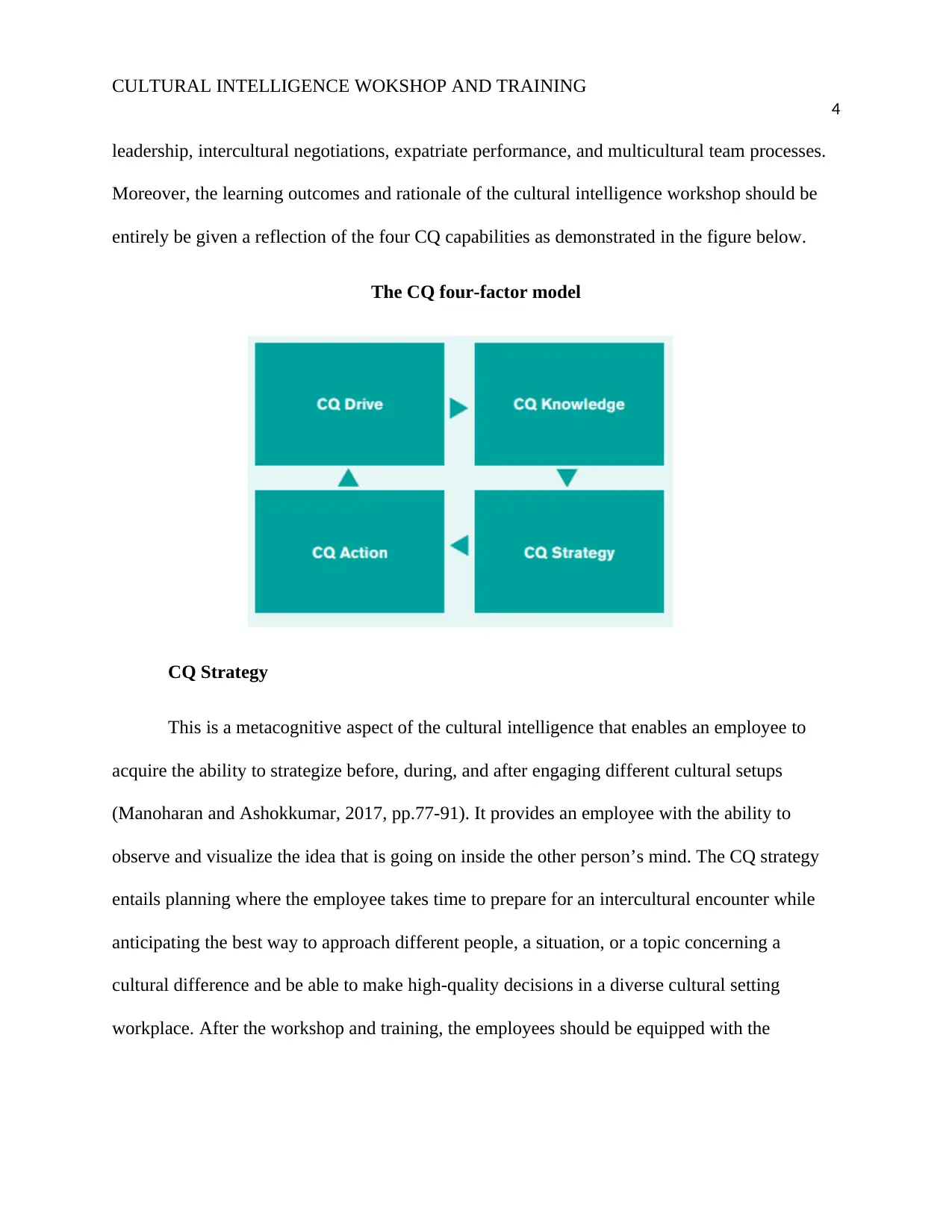
CULTURAL INTELLIGENCE WOKSHOP AND TRAINING
4
leadership, intercultural negotiations, expatriate performance, and multicultural team processes.
Moreover, the learning outcomes and rationale of the cultural intelligence workshop should be
entirely be given a reflection of the four CQ capabilities as demonstrated in the figure below.
The CQ four-factor model
CQ Strategy
This is a metacognitive aspect of the cultural intelligence that enables an employee to
acquire the ability to strategize before, during, and after engaging different cultural setups
(Manoharan and Ashokkumar, 2017, pp.77-91). It provides an employee with the ability to
observe and visualize the idea that is going on inside the other person’s mind. The CQ strategy
entails planning where the employee takes time to prepare for an intercultural encounter while
anticipating the best way to approach different people, a situation, or a topic concerning a
cultural difference and be able to make high-quality decisions in a diverse cultural setting
workplace. After the workshop and training, the employees should be equipped with the
4
leadership, intercultural negotiations, expatriate performance, and multicultural team processes.
Moreover, the learning outcomes and rationale of the cultural intelligence workshop should be
entirely be given a reflection of the four CQ capabilities as demonstrated in the figure below.
The CQ four-factor model
CQ Strategy
This is a metacognitive aspect of the cultural intelligence that enables an employee to
acquire the ability to strategize before, during, and after engaging different cultural setups
(Manoharan and Ashokkumar, 2017, pp.77-91). It provides an employee with the ability to
observe and visualize the idea that is going on inside the other person’s mind. The CQ strategy
entails planning where the employee takes time to prepare for an intercultural encounter while
anticipating the best way to approach different people, a situation, or a topic concerning a
cultural difference and be able to make high-quality decisions in a diverse cultural setting
workplace. After the workshop and training, the employees should be equipped with the
Paraphrase This Document
Need a fresh take? Get an instant paraphrase of this document with our AI Paraphraser
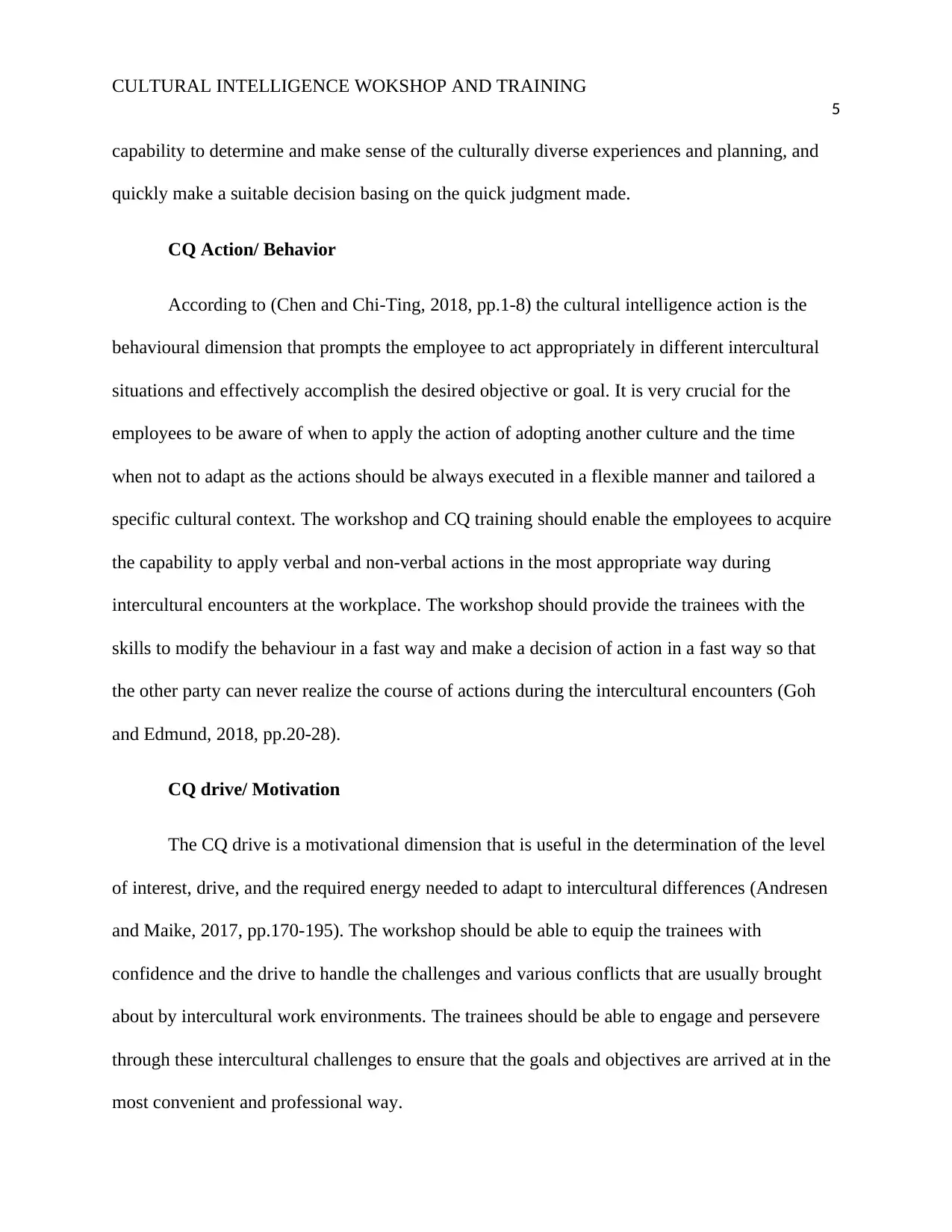
CULTURAL INTELLIGENCE WOKSHOP AND TRAINING
5
capability to determine and make sense of the culturally diverse experiences and planning, and
quickly make a suitable decision basing on the quick judgment made.
CQ Action/ Behavior
According to (Chen and Chi-Ting, 2018, pp.1-8) the cultural intelligence action is the
behavioural dimension that prompts the employee to act appropriately in different intercultural
situations and effectively accomplish the desired objective or goal. It is very crucial for the
employees to be aware of when to apply the action of adopting another culture and the time
when not to adapt as the actions should be always executed in a flexible manner and tailored a
specific cultural context. The workshop and CQ training should enable the employees to acquire
the capability to apply verbal and non-verbal actions in the most appropriate way during
intercultural encounters at the workplace. The workshop should provide the trainees with the
skills to modify the behaviour in a fast way and make a decision of action in a fast way so that
the other party can never realize the course of actions during the intercultural encounters (Goh
and Edmund, 2018, pp.20-28).
CQ drive/ Motivation
The CQ drive is a motivational dimension that is useful in the determination of the level
of interest, drive, and the required energy needed to adapt to intercultural differences (Andresen
and Maike, 2017, pp.170-195). The workshop should be able to equip the trainees with
confidence and the drive to handle the challenges and various conflicts that are usually brought
about by intercultural work environments. The trainees should be able to engage and persevere
through these intercultural challenges to ensure that the goals and objectives are arrived at in the
most convenient and professional way.
5
capability to determine and make sense of the culturally diverse experiences and planning, and
quickly make a suitable decision basing on the quick judgment made.
CQ Action/ Behavior
According to (Chen and Chi-Ting, 2018, pp.1-8) the cultural intelligence action is the
behavioural dimension that prompts the employee to act appropriately in different intercultural
situations and effectively accomplish the desired objective or goal. It is very crucial for the
employees to be aware of when to apply the action of adopting another culture and the time
when not to adapt as the actions should be always executed in a flexible manner and tailored a
specific cultural context. The workshop and CQ training should enable the employees to acquire
the capability to apply verbal and non-verbal actions in the most appropriate way during
intercultural encounters at the workplace. The workshop should provide the trainees with the
skills to modify the behaviour in a fast way and make a decision of action in a fast way so that
the other party can never realize the course of actions during the intercultural encounters (Goh
and Edmund, 2018, pp.20-28).
CQ drive/ Motivation
The CQ drive is a motivational dimension that is useful in the determination of the level
of interest, drive, and the required energy needed to adapt to intercultural differences (Andresen
and Maike, 2017, pp.170-195). The workshop should be able to equip the trainees with
confidence and the drive to handle the challenges and various conflicts that are usually brought
about by intercultural work environments. The trainees should be able to engage and persevere
through these intercultural challenges to ensure that the goals and objectives are arrived at in the
most convenient and professional way.
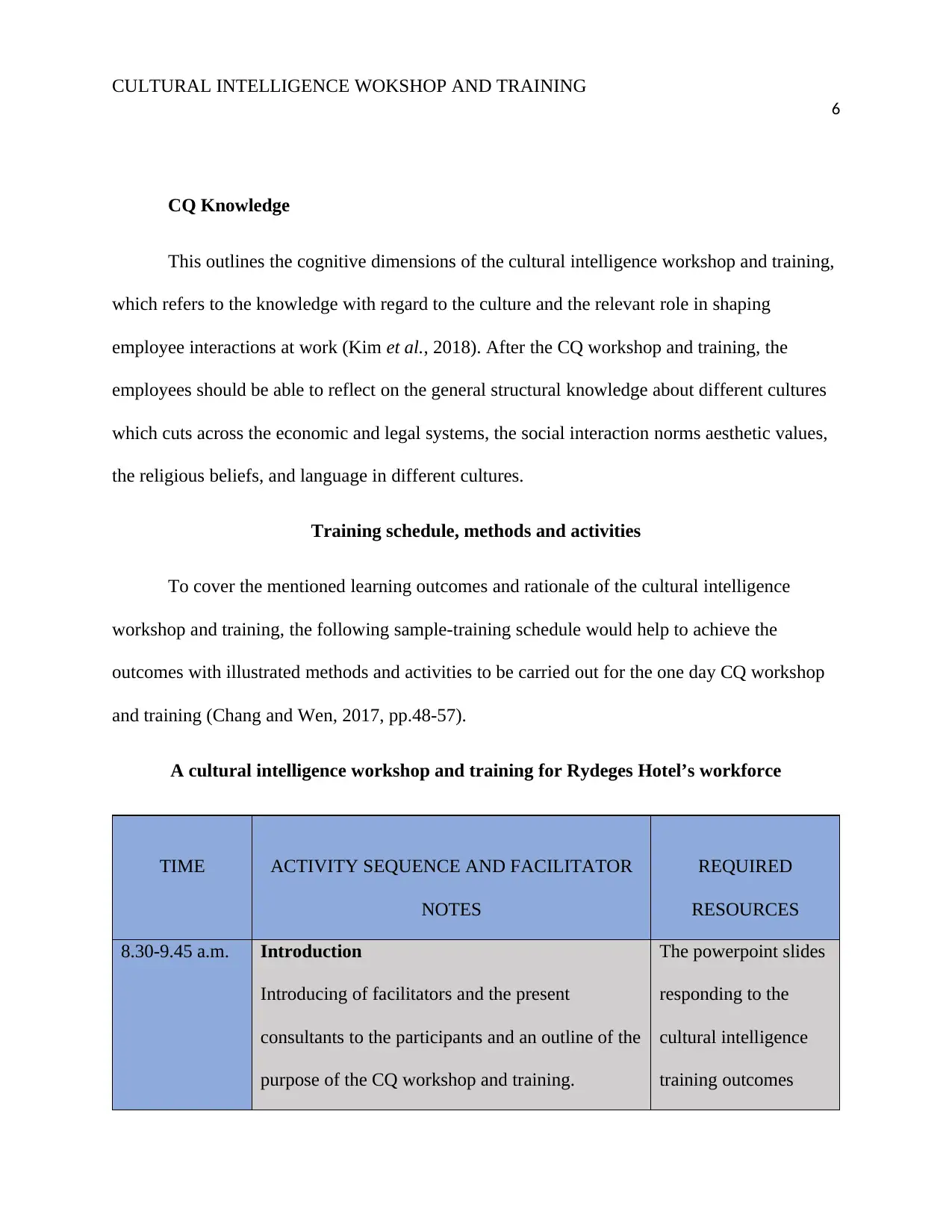
CULTURAL INTELLIGENCE WOKSHOP AND TRAINING
6
CQ Knowledge
This outlines the cognitive dimensions of the cultural intelligence workshop and training,
which refers to the knowledge with regard to the culture and the relevant role in shaping
employee interactions at work (Kim et al., 2018). After the CQ workshop and training, the
employees should be able to reflect on the general structural knowledge about different cultures
which cuts across the economic and legal systems, the social interaction norms aesthetic values,
the religious beliefs, and language in different cultures.
Training schedule, methods and activities
To cover the mentioned learning outcomes and rationale of the cultural intelligence
workshop and training, the following sample-training schedule would help to achieve the
outcomes with illustrated methods and activities to be carried out for the one day CQ workshop
and training (Chang and Wen, 2017, pp.48-57).
A cultural intelligence workshop and training for Rydeges Hotel’s workforce
TIME ACTIVITY SEQUENCE AND FACILITATOR
NOTES
REQUIRED
RESOURCES
8.30-9.45 a.m. Introduction
Introducing of facilitators and the present
consultants to the participants and an outline of the
purpose of the CQ workshop and training.
The powerpoint slides
responding to the
cultural intelligence
training outcomes
6
CQ Knowledge
This outlines the cognitive dimensions of the cultural intelligence workshop and training,
which refers to the knowledge with regard to the culture and the relevant role in shaping
employee interactions at work (Kim et al., 2018). After the CQ workshop and training, the
employees should be able to reflect on the general structural knowledge about different cultures
which cuts across the economic and legal systems, the social interaction norms aesthetic values,
the religious beliefs, and language in different cultures.
Training schedule, methods and activities
To cover the mentioned learning outcomes and rationale of the cultural intelligence
workshop and training, the following sample-training schedule would help to achieve the
outcomes with illustrated methods and activities to be carried out for the one day CQ workshop
and training (Chang and Wen, 2017, pp.48-57).
A cultural intelligence workshop and training for Rydeges Hotel’s workforce
TIME ACTIVITY SEQUENCE AND FACILITATOR
NOTES
REQUIRED
RESOURCES
8.30-9.45 a.m. Introduction
Introducing of facilitators and the present
consultants to the participants and an outline of the
purpose of the CQ workshop and training.
The powerpoint slides
responding to the
cultural intelligence
training outcomes
⊘ This is a preview!⊘
Do you want full access?
Subscribe today to unlock all pages.

Trusted by 1+ million students worldwide
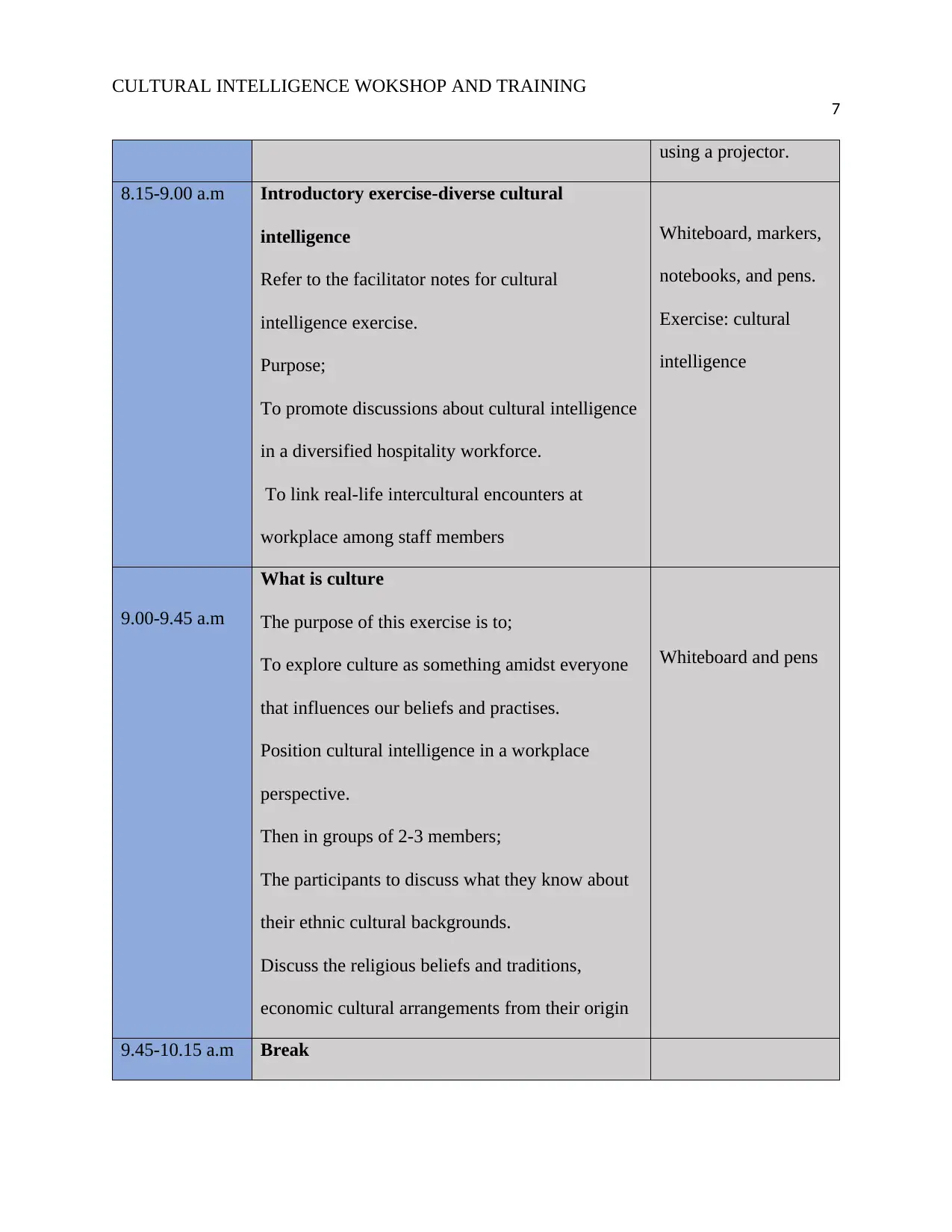
CULTURAL INTELLIGENCE WOKSHOP AND TRAINING
7
using a projector.
8.15-9.00 a.m Introductory exercise-diverse cultural
intelligence
Refer to the facilitator notes for cultural
intelligence exercise.
Purpose;
To promote discussions about cultural intelligence
in a diversified hospitality workforce.
To link real-life intercultural encounters at
workplace among staff members
Whiteboard, markers,
notebooks, and pens.
Exercise: cultural
intelligence
9.00-9.45 a.m
What is culture
The purpose of this exercise is to;
To explore culture as something amidst everyone
that influences our beliefs and practises.
Position cultural intelligence in a workplace
perspective.
Then in groups of 2-3 members;
The participants to discuss what they know about
their ethnic cultural backgrounds.
Discuss the religious beliefs and traditions,
economic cultural arrangements from their origin
Whiteboard and pens
9.45-10.15 a.m Break
7
using a projector.
8.15-9.00 a.m Introductory exercise-diverse cultural
intelligence
Refer to the facilitator notes for cultural
intelligence exercise.
Purpose;
To promote discussions about cultural intelligence
in a diversified hospitality workforce.
To link real-life intercultural encounters at
workplace among staff members
Whiteboard, markers,
notebooks, and pens.
Exercise: cultural
intelligence
9.00-9.45 a.m
What is culture
The purpose of this exercise is to;
To explore culture as something amidst everyone
that influences our beliefs and practises.
Position cultural intelligence in a workplace
perspective.
Then in groups of 2-3 members;
The participants to discuss what they know about
their ethnic cultural backgrounds.
Discuss the religious beliefs and traditions,
economic cultural arrangements from their origin
Whiteboard and pens
9.45-10.15 a.m Break
Paraphrase This Document
Need a fresh take? Get an instant paraphrase of this document with our AI Paraphraser
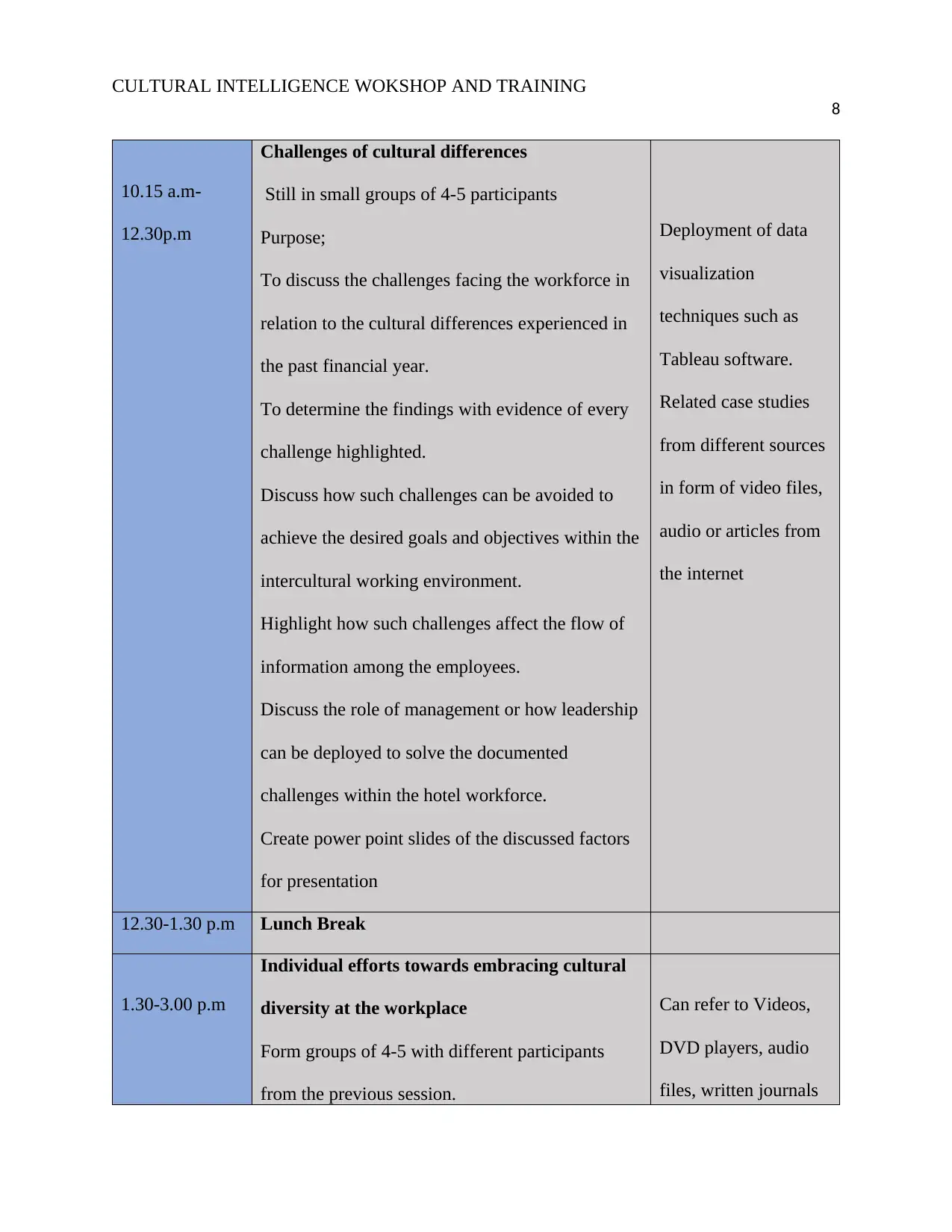
CULTURAL INTELLIGENCE WOKSHOP AND TRAINING
8
10.15 a.m-
12.30p.m
Challenges of cultural differences
Still in small groups of 4-5 participants
Purpose;
To discuss the challenges facing the workforce in
relation to the cultural differences experienced in
the past financial year.
To determine the findings with evidence of every
challenge highlighted.
Discuss how such challenges can be avoided to
achieve the desired goals and objectives within the
intercultural working environment.
Highlight how such challenges affect the flow of
information among the employees.
Discuss the role of management or how leadership
can be deployed to solve the documented
challenges within the hotel workforce.
Create power point slides of the discussed factors
for presentation
Deployment of data
visualization
techniques such as
Tableau software.
Related case studies
from different sources
in form of video files,
audio or articles from
the internet
12.30-1.30 p.m Lunch Break
1.30-3.00 p.m
Individual efforts towards embracing cultural
diversity at the workplace
Form groups of 4-5 with different participants
from the previous session.
Can refer to Videos,
DVD players, audio
files, written journals
8
10.15 a.m-
12.30p.m
Challenges of cultural differences
Still in small groups of 4-5 participants
Purpose;
To discuss the challenges facing the workforce in
relation to the cultural differences experienced in
the past financial year.
To determine the findings with evidence of every
challenge highlighted.
Discuss how such challenges can be avoided to
achieve the desired goals and objectives within the
intercultural working environment.
Highlight how such challenges affect the flow of
information among the employees.
Discuss the role of management or how leadership
can be deployed to solve the documented
challenges within the hotel workforce.
Create power point slides of the discussed factors
for presentation
Deployment of data
visualization
techniques such as
Tableau software.
Related case studies
from different sources
in form of video files,
audio or articles from
the internet
12.30-1.30 p.m Lunch Break
1.30-3.00 p.m
Individual efforts towards embracing cultural
diversity at the workplace
Form groups of 4-5 with different participants
from the previous session.
Can refer to Videos,
DVD players, audio
files, written journals
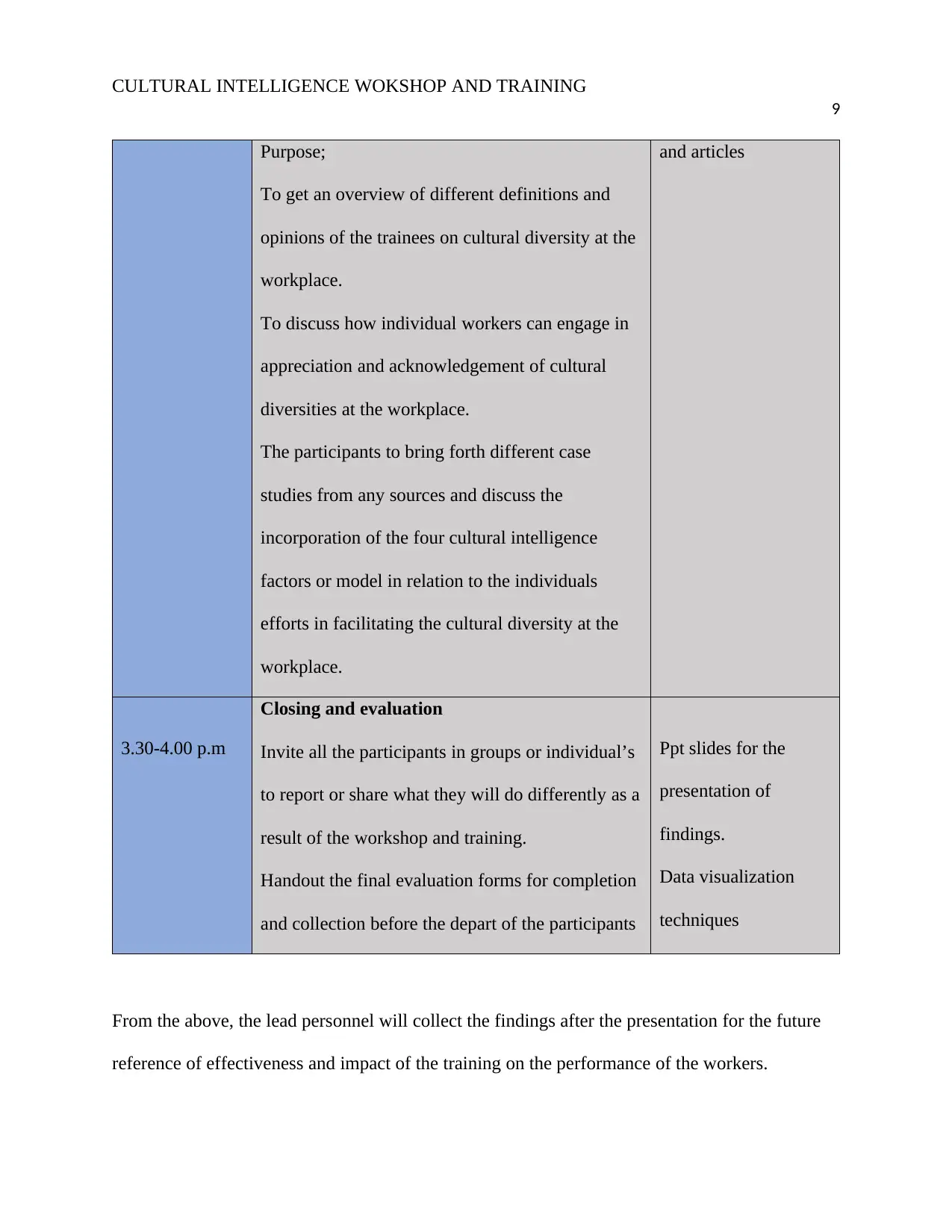
CULTURAL INTELLIGENCE WOKSHOP AND TRAINING
9
Purpose;
To get an overview of different definitions and
opinions of the trainees on cultural diversity at the
workplace.
To discuss how individual workers can engage in
appreciation and acknowledgement of cultural
diversities at the workplace.
The participants to bring forth different case
studies from any sources and discuss the
incorporation of the four cultural intelligence
factors or model in relation to the individuals
efforts in facilitating the cultural diversity at the
workplace.
and articles
3.30-4.00 p.m
Closing and evaluation
Invite all the participants in groups or individual’s
to report or share what they will do differently as a
result of the workshop and training.
Handout the final evaluation forms for completion
and collection before the depart of the participants
Ppt slides for the
presentation of
findings.
Data visualization
techniques
From the above, the lead personnel will collect the findings after the presentation for the future
reference of effectiveness and impact of the training on the performance of the workers.
9
Purpose;
To get an overview of different definitions and
opinions of the trainees on cultural diversity at the
workplace.
To discuss how individual workers can engage in
appreciation and acknowledgement of cultural
diversities at the workplace.
The participants to bring forth different case
studies from any sources and discuss the
incorporation of the four cultural intelligence
factors or model in relation to the individuals
efforts in facilitating the cultural diversity at the
workplace.
and articles
3.30-4.00 p.m
Closing and evaluation
Invite all the participants in groups or individual’s
to report or share what they will do differently as a
result of the workshop and training.
Handout the final evaluation forms for completion
and collection before the depart of the participants
Ppt slides for the
presentation of
findings.
Data visualization
techniques
From the above, the lead personnel will collect the findings after the presentation for the future
reference of effectiveness and impact of the training on the performance of the workers.
⊘ This is a preview!⊘
Do you want full access?
Subscribe today to unlock all pages.

Trusted by 1+ million students worldwide
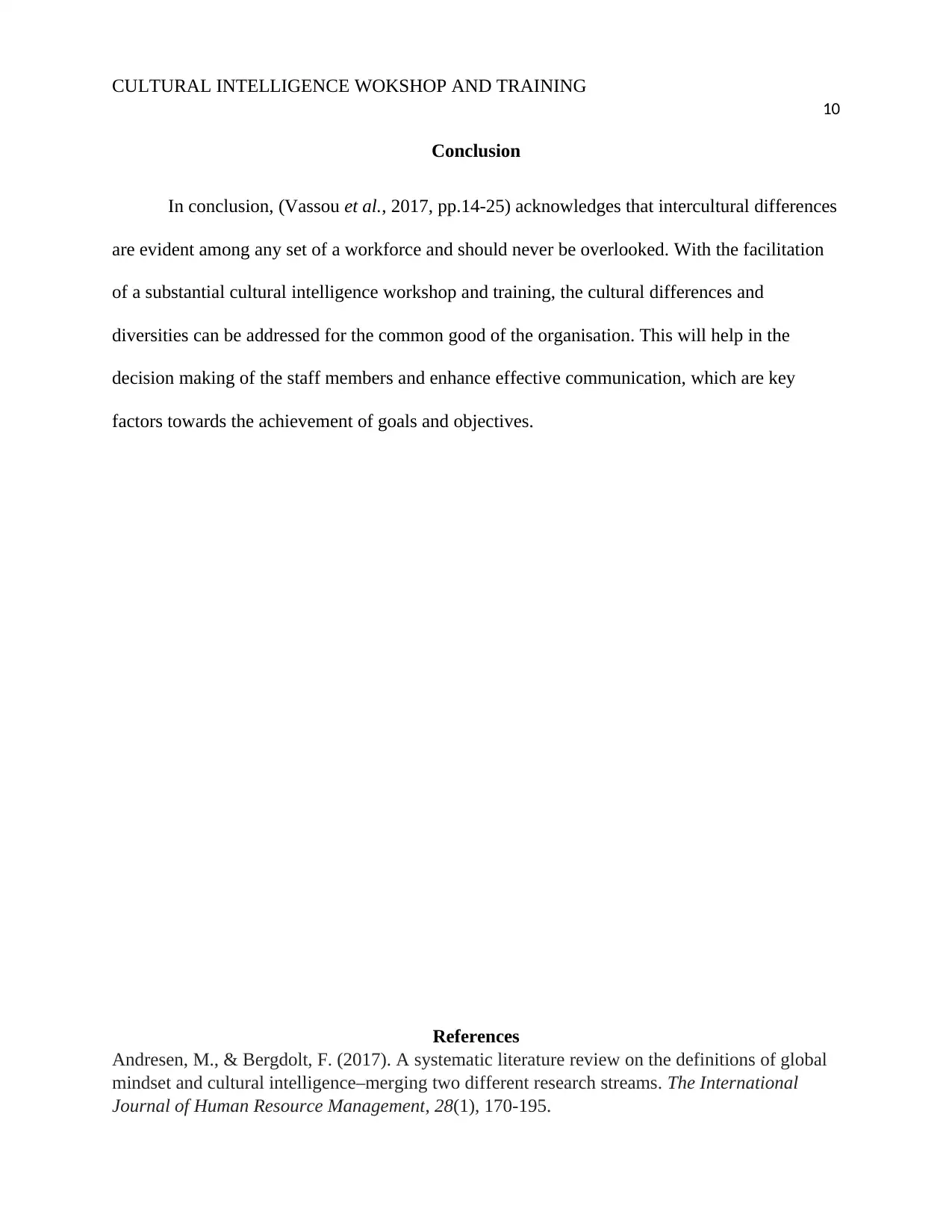
CULTURAL INTELLIGENCE WOKSHOP AND TRAINING
10
Conclusion
In conclusion, (Vassou et al., 2017, pp.14-25) acknowledges that intercultural differences
are evident among any set of a workforce and should never be overlooked. With the facilitation
of a substantial cultural intelligence workshop and training, the cultural differences and
diversities can be addressed for the common good of the organisation. This will help in the
decision making of the staff members and enhance effective communication, which are key
factors towards the achievement of goals and objectives.
References
Andresen, M., & Bergdolt, F. (2017). A systematic literature review on the definitions of global
mindset and cultural intelligence–merging two different research streams. The International
Journal of Human Resource Management, 28(1), 170-195.
10
Conclusion
In conclusion, (Vassou et al., 2017, pp.14-25) acknowledges that intercultural differences
are evident among any set of a workforce and should never be overlooked. With the facilitation
of a substantial cultural intelligence workshop and training, the cultural differences and
diversities can be addressed for the common good of the organisation. This will help in the
decision making of the staff members and enhance effective communication, which are key
factors towards the achievement of goals and objectives.
References
Andresen, M., & Bergdolt, F. (2017). A systematic literature review on the definitions of global
mindset and cultural intelligence–merging two different research streams. The International
Journal of Human Resource Management, 28(1), 170-195.
Paraphrase This Document
Need a fresh take? Get an instant paraphrase of this document with our AI Paraphraser
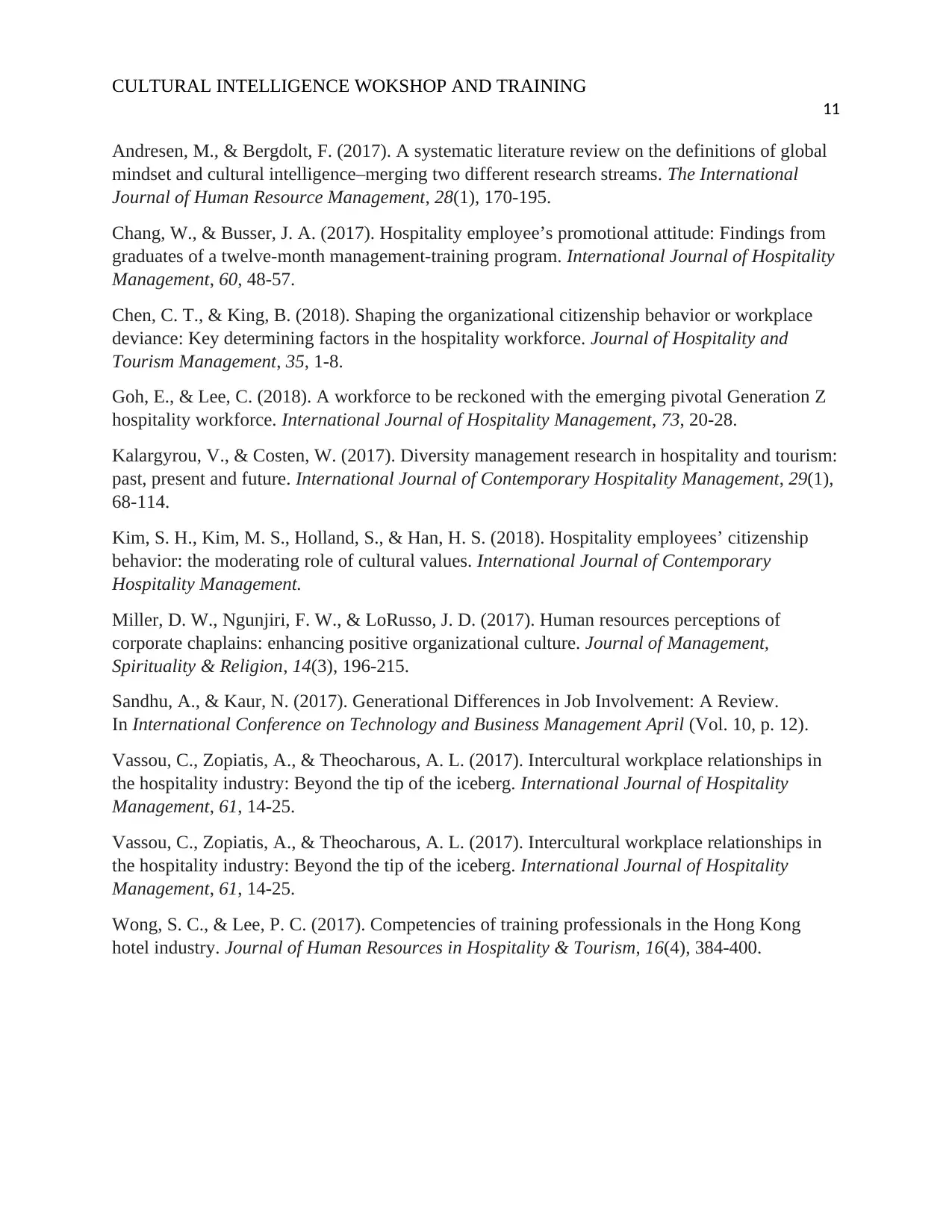
CULTURAL INTELLIGENCE WOKSHOP AND TRAINING
11
Andresen, M., & Bergdolt, F. (2017). A systematic literature review on the definitions of global
mindset and cultural intelligence–merging two different research streams. The International
Journal of Human Resource Management, 28(1), 170-195.
Chang, W., & Busser, J. A. (2017). Hospitality employee’s promotional attitude: Findings from
graduates of a twelve-month management-training program. International Journal of Hospitality
Management, 60, 48-57.
Chen, C. T., & King, B. (2018). Shaping the organizational citizenship behavior or workplace
deviance: Key determining factors in the hospitality workforce. Journal of Hospitality and
Tourism Management, 35, 1-8.
Goh, E., & Lee, C. (2018). A workforce to be reckoned with the emerging pivotal Generation Z
hospitality workforce. International Journal of Hospitality Management, 73, 20-28.
Kalargyrou, V., & Costen, W. (2017). Diversity management research in hospitality and tourism:
past, present and future. International Journal of Contemporary Hospitality Management, 29(1),
68-114.
Kim, S. H., Kim, M. S., Holland, S., & Han, H. S. (2018). Hospitality employees’ citizenship
behavior: the moderating role of cultural values. International Journal of Contemporary
Hospitality Management.
Miller, D. W., Ngunjiri, F. W., & LoRusso, J. D. (2017). Human resources perceptions of
corporate chaplains: enhancing positive organizational culture. Journal of Management,
Spirituality & Religion, 14(3), 196-215.
Sandhu, A., & Kaur, N. (2017). Generational Differences in Job Involvement: A Review.
In International Conference on Technology and Business Management April (Vol. 10, p. 12).
Vassou, C., Zopiatis, A., & Theocharous, A. L. (2017). Intercultural workplace relationships in
the hospitality industry: Beyond the tip of the iceberg. International Journal of Hospitality
Management, 61, 14-25.
Vassou, C., Zopiatis, A., & Theocharous, A. L. (2017). Intercultural workplace relationships in
the hospitality industry: Beyond the tip of the iceberg. International Journal of Hospitality
Management, 61, 14-25.
Wong, S. C., & Lee, P. C. (2017). Competencies of training professionals in the Hong Kong
hotel industry. Journal of Human Resources in Hospitality & Tourism, 16(4), 384-400.
11
Andresen, M., & Bergdolt, F. (2017). A systematic literature review on the definitions of global
mindset and cultural intelligence–merging two different research streams. The International
Journal of Human Resource Management, 28(1), 170-195.
Chang, W., & Busser, J. A. (2017). Hospitality employee’s promotional attitude: Findings from
graduates of a twelve-month management-training program. International Journal of Hospitality
Management, 60, 48-57.
Chen, C. T., & King, B. (2018). Shaping the organizational citizenship behavior or workplace
deviance: Key determining factors in the hospitality workforce. Journal of Hospitality and
Tourism Management, 35, 1-8.
Goh, E., & Lee, C. (2018). A workforce to be reckoned with the emerging pivotal Generation Z
hospitality workforce. International Journal of Hospitality Management, 73, 20-28.
Kalargyrou, V., & Costen, W. (2017). Diversity management research in hospitality and tourism:
past, present and future. International Journal of Contemporary Hospitality Management, 29(1),
68-114.
Kim, S. H., Kim, M. S., Holland, S., & Han, H. S. (2018). Hospitality employees’ citizenship
behavior: the moderating role of cultural values. International Journal of Contemporary
Hospitality Management.
Miller, D. W., Ngunjiri, F. W., & LoRusso, J. D. (2017). Human resources perceptions of
corporate chaplains: enhancing positive organizational culture. Journal of Management,
Spirituality & Religion, 14(3), 196-215.
Sandhu, A., & Kaur, N. (2017). Generational Differences in Job Involvement: A Review.
In International Conference on Technology and Business Management April (Vol. 10, p. 12).
Vassou, C., Zopiatis, A., & Theocharous, A. L. (2017). Intercultural workplace relationships in
the hospitality industry: Beyond the tip of the iceberg. International Journal of Hospitality
Management, 61, 14-25.
Vassou, C., Zopiatis, A., & Theocharous, A. L. (2017). Intercultural workplace relationships in
the hospitality industry: Beyond the tip of the iceberg. International Journal of Hospitality
Management, 61, 14-25.
Wong, S. C., & Lee, P. C. (2017). Competencies of training professionals in the Hong Kong
hotel industry. Journal of Human Resources in Hospitality & Tourism, 16(4), 384-400.
1 out of 11
Related Documents
Your All-in-One AI-Powered Toolkit for Academic Success.
+13062052269
info@desklib.com
Available 24*7 on WhatsApp / Email
![[object Object]](/_next/static/media/star-bottom.7253800d.svg)
Unlock your academic potential
Copyright © 2020–2025 A2Z Services. All Rights Reserved. Developed and managed by ZUCOL.





